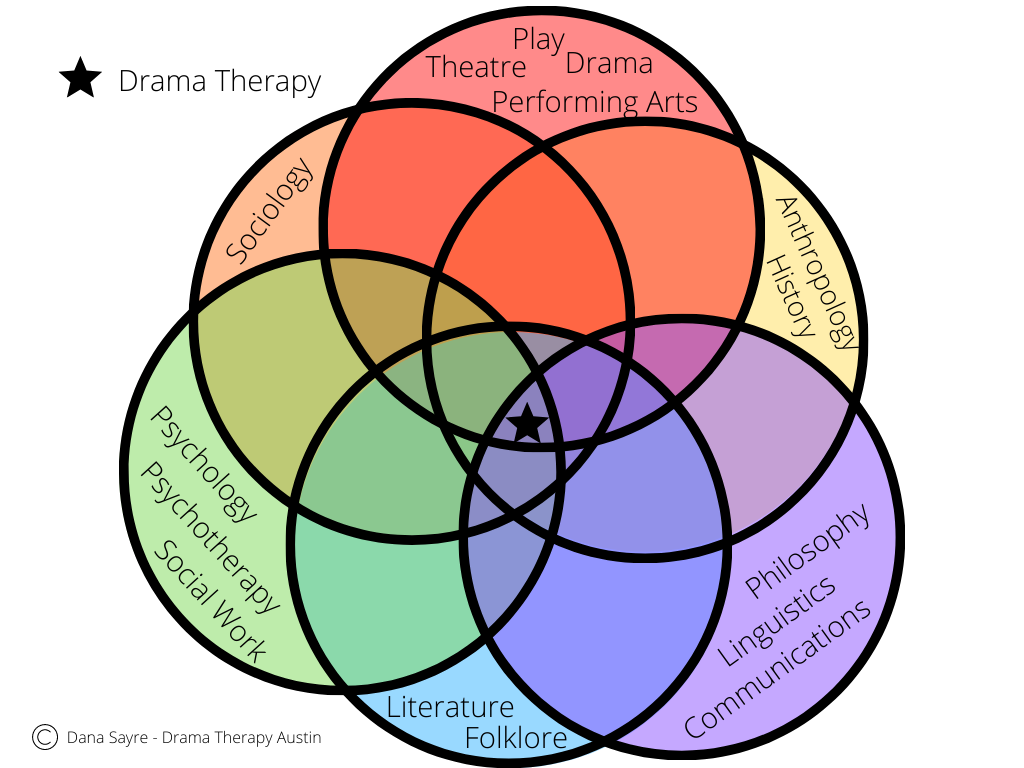I have previously explored the foundations of drama therapy as outlined by the North American Drama Therapy Association. That article was more of an overview. Now, I want to take a deeper dive into exploring the diversity of influences within the field.
How Do You Become a Drama Therapist?
There is no one path towards becoming a Drama Therapist. That is part of what makes the field so powerful.
Drama Therapists come to the field from a variety of paths. These include, but are not limited to: Theatre in Education, Special Education, Counseling, Social Work, Acting, Directing, Applied Theatre, Performance Studies, Playwrighting, Dramaturgy, Creative Drama, and more!
Some Drama Therapists start out as theatre artists. Others begin as theatre educators. There are also Drama Therapists who are social workers or counselors with an interest in the arts in health. And we can’t discount the influence of the arts in activism and community organizing, as evidenced via the incorporation of techniques like Theatre of the Oppressed.
What Are the Influences Behind Drama Therapy?
I originally explored Drama Therapy as the intersection of Theatre, Drama, Play, Anthropology, Psychology, and Psychotherapy. But even that viewpoint is limited in may ways.
For example, my background is in Theatre and Performance Studies. Performance Studies integrates a variety of Humanities disciplines to create a more holistic view of Performance than is possible from within Fine Arts alone. This allows us to understand the Performing Arts as foundational to the history of humanity, and our ongoing understanding of what it means to be human.
As a result, my personal Venn Diagram actually looks more like this!

The Interdisciplinary Influences of Drama Therapy
From a more expanded view, what we call Drama Therapy is the intersection of the following fields:
- The Performing Arts (including Theatre, Drama, and Play, but also music, opera, dance, musical theatre, applied theatre, circus arts, pantomime, magic, etc.)
- Anthropology and History
- Philosophy, Communications, and Linguistics
- Literature and Folklore
- Psychology, Psychotherapy, and Social Work
- Sociology
This isn’t even to mention other interdisciplinary fields like Cultural Studies, Ethnic Studies, American Studies, Gender Studies, Critical Disability Studies, Queer Theory, Critical Trauma Studies, and more!
Due to COVID-19, many Drama Therapists have also been exploring the potential of therapeutic film.
Many Drama Therapists integrate technology into their work, to create multi-media experiences.
What Do Drama Therapists Have in Common?
What unites us as Drama Therapists is the desire to learn more about the therapeutic potential of dramatic processes, and how participation in the performing arts can contribute to healing.
Humans have been engaging in rituals, storytelling, and various cultural performances since the beginnings of human history. Calling what we do Drama Therapy allows us to create a common vocabulary, build community and connection with like-minded individuals, and build a shared understanding of the work we do.
There’s no one way to be a Drama Therapist, and no one way that doing Drama Therapy can look.
Each Drama Therapist tailors their practice according to their own unique history, worldview, experience, interests, and lens. Like any artist, each of us has a unique voice and vision for our artistic expression.
What I Do
I take a very holistic approach.
I situate Drama Therapy within a broader understanding of how we (re)create culture within group processes. I see groups as a microcosm of the larger society. As a result, Drama Therapy allows us to be self-aware about how we show up in groups. We can explore how we are influenced not only by our personal and family history, but our membership in a variety of social and cultural identities and communities.
I want to use Drama Therapy to explore and interrogate social roles and systems, with an eye towards social justice and liberation. If we understand how culture is created, we can find agency to shape society to be more equitable, inclusive, and egalitarian.
I want to use Drama Therapy as a way to broaden the types of stories we are able to tell, and as a way of both imagining and practicing a future that we can believe in.
If that sounds interesting to you, or you want to learn more, contact me to set up a consultation!